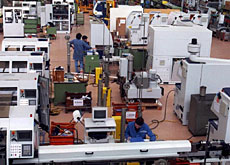Recession strikes Swiss economy

The Swiss economy slipped into recession at the start of the year, with the gross domestic product (GDP) contracting by one per cent during the first quarter, according to the latest figures.
Government officials blamed the strong Swiss franc coupled with weak exports and poor consumer demand.
On Thursday, figures by the State Secretariat for Economic Affairs (Seco) showed two successive quarters of negative GDP growth – in line with economists’ definition of a recession.
The first quarter GDP fell 0.6 per cent from the same quarter a year ago. Seco also sharply revised its figures for the last three months of 2002 downwards, from 1.4 per cent to minus 0.7 per cent.
“We can now consider the winter semester as being a period of recession,” said Aymo Brunetti, Seco’s chief economist.
Switzerland had already recorded two quarters of negative growth at the end of 2001 and the beginning of 2002, although officials refused at the time to talk of a recession.
No tourists
The first three months of the year were characterised by a drop of 9.1 per cent in goods and services exports compared with the previous quarter.
According to Seco, the strong franc and the European Union’s weakened economy, especially in Germany, wreaked havoc on goods exports, which slumped by eight per cent.
The service industry was hit particularly hard, losing over 13 per cent compared with the end of last year, mainly due to the drop-off in the vital tourism sector.
“Tourists just didn’t come to Switzerland this year,” said Frederic Metlow, an economist at Credit Suisse, adding that Swiss banks saw their foreign activities also take a beating during the first quarter.
Investments were down as well, especially in purchases of machinery, precision tools, trucks and aircraft. Seco attributed this to companies’ lack of confidence in their future.
Steady consumers
Consumers, on the other hand, increased their spending by 1.2 per cent from the previous quarter, investing marginally more on housing, healthcare and food.
However, the Swiss spent less on clothing, furniture, leisure and cars.
Imports rose by 5.1 per cent, mainly thanks to pharmaceuticals.
Slow upturn
Seco believes the downward spiral is nearly over and that the situation should improve by next year. Officials said that since the end of hostilities in Iraq, the economy has already begun to pick up.
Analysts agree that there is some light at the end of the tunnel, but say it will be a bumpy ride. Hanspeter Hausherr, an economist at the UBS bank, believes negative GDP growth is still on the cards for the second quarter.
Seco’s Brunetti warns that the Swiss shouldn’t expect any rapid improvement. “I am reasonably optimistic, but it will all depend on how the economy performs outside of Switzerland,” he said.
Seco reckons the economy will stagnate this year and forecasting GDP growth of 1.6 per cent in 2004.
swissinfo with agencies
Switzerland’s real GDP dropped one per cent during the first quarter compared to the previous three months.
The final quarter of 2002 also recorded negative growth.
The two quarters of negative results means Switzerland has entered a phase of recession.
Exports of goods and services showed the sharpest decline, with the tourism sector suffering in particular.

In compliance with the JTI standards
More: SWI swissinfo.ch certified by the Journalism Trust Initiative












You can find an overview of ongoing debates with our journalists here . Please join us!
If you want to start a conversation about a topic raised in this article or want to report factual errors, email us at english@swissinfo.ch.